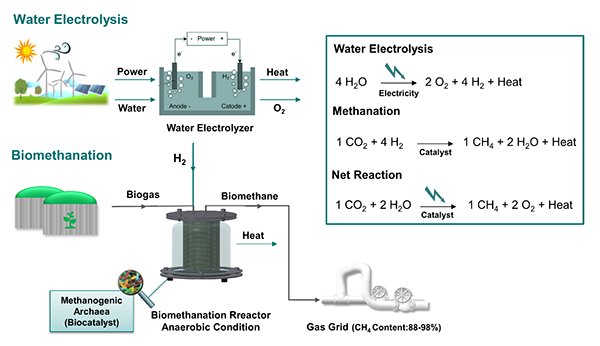Hoda Khesali
Biological Conversion of CO2 and H2 to CH4
Moving forward with climate change mitigation, it's imperative to increase the share of power derived from renewable energy resources. In particular, there is a growing need for highly flexible storage technologies that allows to balance demand and supply. The conversion of renewable H2 using biogenic CO2 from biogas production can upgrade biogas to produce pure biomethane. Specifically, this process can buffer the inherent fluctuations in the generation of electricity from renewable sources by conversion and storage of surplus power into CH4.
While chemical methanation has been shown to be sensitive to power fluctuations, biological methanation, managed by methanogenic archaea, is reportedly less sensitive to H2 shortages. It occurs under mild conditions (30-60°C, 1 atm) and only requires a relatively modest technical input. Additionally, methanogenic microorganisms as biocatalysts exhibit a high affinity for hydrogen, and convert it efficiently into methane, even at low concentrations. All these properties support the operation of methanation processes in response to excess electricity availability in the grid.
Within the scope of the "Altmarkenergie" project (see below), our research is dedicated to establishing processes for the exogenous biological methanation of CO2. A central focus lies in optimizing the space-time yield. The following challenges are addressed: (1) the conversion rate of biological CO2 to CH4, (2) the transfer of gaseous substrates into the liquid phase of bioreactors, and (3) the stability of the microbial communities acting as biocatalysts. To be better characterize and optimize biological methanation processes, various pure, mixed, and enriched cultures, along with diverse reactor concepts and process regimes are tested. Additionally, the composition of microbial cultures is characterized through metaproteomics analyses to obtain in-depth knowledge in biochemical pathways and substrate handling and providing insights for selection of process conditions.

Figure 1: Storage of renewable electricity in the form of biomethane using H2 produced in an intermediate water electrolysis step and biological methanation of CO2 from biogas plant.
This project is part of the CDSresearch field in energy conversion and constitutes one of the four work-packages within the collaborative "Altmarkenergie" project. This initiative was launched at the Max Planck Institute for Dynamics of Complex Technical Systems, in collaboration with Otto von Guericke University in Magdeburg on January 30th, 2017.
References:
Khesali Aghtaei H, Püttker S, Maus I, Heyer R, Huang L, Sczyrba A, Reichl U, Benndorf D (2022). Adaptation of a microbial community to demand-oriented biological methanation. Biotechnol Biofuels Bioprod 16;15(1):125.
Heyer R, Schallert K, Büdel A, Zoun R, Dorl S, Behne A, Kohrs F, Püttker S, Siewert C, Muth T, Saake G, Reichl U, Benndorf D (2019). A robust and universal metaproteomics workflow for research studies and routine diagnostics within 24 h using phenol extraction, FASP digest, and the MetaProteomeAnalyzer. Front Microbiol, 16;10:1883.
Heyer R, Benndorf D, Kohrs F, De Vrieze J, Boon N, Hoffmann M, Rapp E, Schlüter A, Sczyrba A, Reichl U (2016) Proteotyping of biogas plant microbiomes separates biogas plants according to process temperature and reactor type. Biotechnol Biofuels Bioprod 26;9:155.
Heyer R, Kohrs F, Reichl U, Benndorf D (2015). Metaproteomics of complex microbial communities in biogas plants. Microb Biotechnol 8(5):749-63.